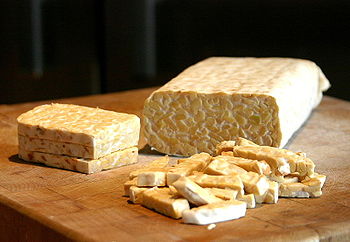Tempeh
From Wikiwel
see also :
Tempeh, is a traditional soy product originally from Indonesia. It is made by a natural culturing and controlled fermentation process that binds soybeans into a cake form, similar to a very firm vegetarian burger patty. Tempeh is unique among major traditional soy foods in that it is the only one that did not originate from the Sinosphere and Indian cuisine.
Special Precautions of Tempeh
- Tempeh can cause allergic reactions in some people.
- Tempeh contains a small amount of oxalates, which if accumulated, can cause several health problems. Because of this, people suffering from kidney and gall bladder problems should avoid eating tempeh.
Benefits and uses of Tempeh are
- Tempeh is a rich source of proteins. The proteins in tempeh have the additional benefit of lowering cholesterol level, unlike the protein from animal sources, which raise the cholesterol level of a person. Thus, tempeh is an excellent alternative to meat.
- Tempeh contains magnesium, which plays a vital role in cardiovascular system and in more than 300 enzymatic reactions. Magnesium is also necessary for the reactions like the control of protein synthesis and energy production.
- Tempeh helps in preventing heart diseases. It reduces the cholesterol level and hence, lowers the risk of heart attack or stroke.
- Tempeh also raises the HDL cholesterol levels. HDL cholesterol passes through the body and collects the cholesterols in the arteries to be disposed off by the liver. Tempeh can even lower LDL cholesterol levels, apart from raising HDL.
- Tempeh, like other Soy food, is rich in dietary fiber, which binds fats and cholesterol and prevents their rapid absorption. Also, the dietary fiber binds the bile salts and helps throw them out of the body. As it disposes the bile, liver is stimulated to convert more cholesterol into bile salts, thereby lowering the cholesterol level in the body considerably.
- The fiber present in tempeh lowers the risk of colon cancer, by being able to bind the cancer-causing toxins. It is also preventative against some other cancers, like breast cancer.
- Tempeh is also helpful in treating menopausal symptoms. The isoflavones present in tempeh bind to the estrogen receptors and provide relief from the uncomfortable symptoms associated with the decline of natural estrogen. Also, it helps reduce the bone loss that generally follows menopause.
- Tempeh contains a good amount of the trace minerals, like manganese and copper. These minerals play an important role in numerous physiological functions. They are also the cofactors for the antioxidant enzyme superoxide dismutase.
- Tempeh has a rich content of riboflavin, which is the nutrient required for the transfer reactions that act to produce energy for the mitochondria. Riboflavin is again the cofactor for the regeneration of glutathione.
- Tempeh contains genistein, which plays a significant role in lowering the risk of prostate cancer in men.
- Tempeh is an extremely healthy food for people suffering from diabetes. Its properties to lower cholesterol and blood sugar level prove helpful for diabetic patients. Also, tempeh lowers the triglyceride levels in diabetic patients.
